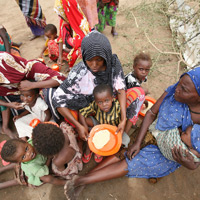
Ken Menkhaus is a professor of political science at Davidson College and a specialist on Somalia and the Horn of Africa. He worked on famine response policy in Somalia in 1991 and served as a political advisor in the U.N. Operation in Somalia in 1993-94. He is author of over 50 monographs, chapters, and articles on Somalia and the Horn of Africa, and has testified five times before congressional committees on aspects of the Somali crisis.
Somalia is dying. Three-quarters of a million people are at immediate risk of famine; another 750,000 are refugees in neighboring countries, and 4 million – half the total population – is in need of emergency aid. It is a calamity that could join the ranks of the Rwanda genocide and the Darfur crisis in terms of scale and human suffering. And for Somalia it is a terrible repeat of the 1991-92 famine that claimed 240,000 lives.
The international response to date has been shockingly inadequate – not just because
funds for humanitarian aid have fallen short, but because of the absence of political will
to take bold diplomatic action to remove impediments to the delivery of aid.
Unless this changes, the 2011 Somali famine will be to the Obama administration what
the 1994 Rwandan genocide was to the Clinton administration – a terrible stain, an
unforgiveable instance of lack of political will to push policy beyond incrementalism.
And for the Islamic world, al-Shabaab’s role in the Somali famine will be remembered as
the Islamic Khmer Rouge, in which an armed group with a deeply twisted interpretation
of the faith presides over the mass deaths of its own people.
The core of the problem is this: Aid agencies have very limited access to famine victims
and very limited capacity to monitor food aid deliveries. In the countryside, where 70
percent of the famine victims live, the jihadist group al-Shabaab blocks most aid agencies
and severely curtails the activities of the few that remain. Its leadership has denied
that famine exists, views food aid as a Western conspiracy to undermine Somali farmers,
and tries to block famine victims from fleeing to areas where food aid is available. The
aid that does manage to get to into Shabaab-controlled areas, through delicate bi-lateral
negotiations by individual aid agencies, is not nearly enough.
Areas controlled by the Somali allies of the U.S. government and the United Nations
are little better. In the capital Mogadishu, where famine victims are piling into internally
displaced persons camps, paramilitaries nominally affiliated with the U.N.-backed
Transitional Federal Government, or TFG, divert food aid, prey on famine victims, and
fight among themselves. Rival politicians are setting up their own camps to use as bait
for food aid, which they can then divert. No famine is complete without vultures.
In consequence, the bulk of international relief efforts operate on the edges of the crisis,
especially in the burgeoning refugee camps on the Kenyan-Somali border, which have
now grown to an astonishing 470,000 refugees. This is not a famine relief strategy – it
is a macabre game of “Survivor,” rewarding those lucky and strong enough to straggle
across the border with a prize of shelter, food rations, and the prospect of being warehoused
in a refugee camp for the next 20 years.
We can – and must – do better.

